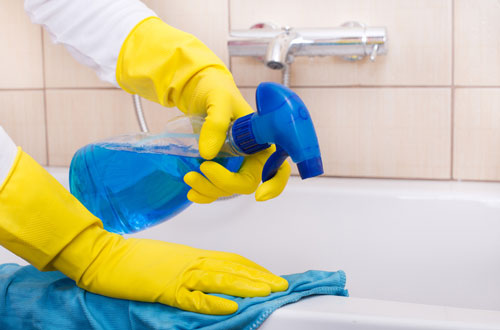Keeping your home looking fresh and clean is hard work. Unfortunately, hard water makes that much more difficult.
From soap scum in your shower, streaks on your mirror, and crusty white residue on your fixtures, to unsightly stains in your toilet, getting rid of these spots is a major chore. For DIY home cleaning advice, keep reading!
What Causes Hard Water Spots?
Calcium and magnesium are what causes water to become “hard.” The minerals dissolve in your home’s water from rocks beneath the earth’s surface. When the water evaporates, it leaves mineral deposits behind.
Some people think only homes with private wells have hard water problems. Truthfully, at least 85 percent of U.S. households have water that’s considered hard. That includes many people that live in cities because municipal water treatment plants do not address water hardness.
Hard water is one of the reasons for clogged showerheads and dirty faucets covered with a chalky white residue. Calcium and magnesium are also responsible for creating soap scum in your shower or bathtub. When these dissolved minerals combine with soap, they form a substance that produces the thick residue.
Hard Water Spot and Stain Removal Hacks
There are cleaning products formulated to help you remove soap scum and hard water spots. The products mainly soften water for you as you clean; however many homeowners prefer not to use harsh chemicals.
Here are a few DIY tips for people who would rather use safe household products to combat soap scum. The most common ingredients include white vinegar, baking soda, lemon juice, and Borax.

1. Clean Soap Scum with a Spray Bottle
To get rid of soap scum in your shower, mix half white distilled vinegar and half water in a spray bottle. Allow the solution to sit for a few minutes on the surface before wiping down the shower. The acidity of the vinegar helps combat the alkaline minerals in the hard water deposits.
2. Stained Fixtures
If the area around your sinks or other fixtures contains chalky residue, soak some paper towels in white vinegar, and wrap the paper towels around the base of the fixture. Leave the wet towels for about an hour, and then rinse it with water and wipe away the remaining scum.
3. Toilet Hard Water Stains
For toilets with hard water spots, pour a mixture of either vinegar and baking soda, or vinegar and Borax in the bowl. These combinations create a fizzy chemical reaction that could help you clean away stains by using a toilet brush. Use a cup of baking soda with one cup of white vinegar. If you use Borax instead, mix a quarter cup to one cup of vinegar.
4. Make a Stain-Fighting Paste
For stubborn stains, such as those found on grout and ceramic tile, use Borax or baking soda with white vinegar to create a paste like substance. It would be best if you used less vinegar and more powdered ingredients to form a thick substance. After applying the paste on the stain, wait 15 minutes before scrubbing it away.
5. Clogged Showerheads
If your shower seems to gradually lose water pressure, your showerhead may have become calcified with mineral deposits from hard water. To solve this, remove the showerhead and soak it in white vinegar for a few hours before scrubbing it with a brush. You could also mix vinegar and baking soda in a plastic bag and then place the solution over the showerhead with a rubber band to allow it to soak.
6. Lemon Juice Solution
If you do not have white vinegar on hand, you could use lemon juice instead. Spraying lemon juice on your faucets and fixtures with hard water stains is an effective alternative to chemical cleaners.
Want a Permanent Solution? Get a Water Softener!
The problem with all the cleaning hacks we’ve listed above is you’ll have to keep doing them repeatedly. Soap scum and hard water stains keep coming back until you address the real problem: The quality of your home’s water. The good news is a water softener from Atlantic Blue Water Services can solve all these problems for you. If the issues we’ve mentioned in this article sound familiar to you, call us today at 410-840-2583 for a free evaluation of your home’s water quality.
